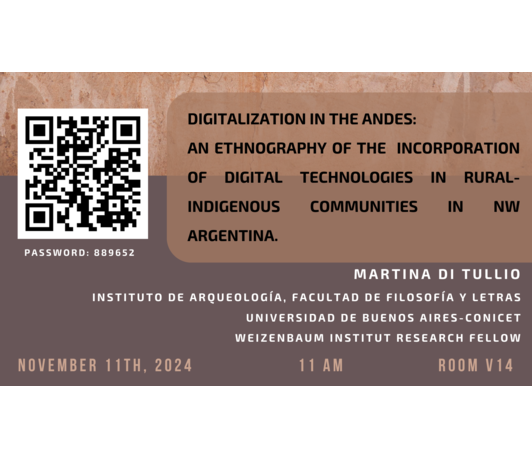Guest Lecture: Digitalization in the Andes. An ethnographic study of the incorporation of digital technologies in rural and Indigenous communities of NW Argentina
- Date: Nov 11, 2024
- Time: 11:00 AM - 12:30 PM (Local Time Germany)
- Speaker: Martina Di Tullio
- University of Buenos Aires
- Location: Hybrid Format - Max Planck Institute of Geoanthropology, seminar room Villa V.14 and Zoom
- Host: isoTROPIC Research Group
- Contact: zucarelli@gea.mpg.de

The Jujuy Puna is part of what is known as the Lithium Triangle, a high-altitude desert area where lithium — one of the most important minerals used in the production of digital technologies— is extracted and processed, causing the pollution of scarce water resources. However, rural and Indigenous populations that historically inhabit this place do not count with phone or data services, and they gained access to Wi-Fi connection only five years ago, when they were included in a state program addressing the digital divide.
This policy offered free internet service in the communities’ public squares, and that was their only means of connectivity up until 2023, when they finally obtained household service. Begun in 2022, this doctoral research project is documenting this process, its discursive meanings and its implications in two communities of the Jujuy Puna: Cusi Cusi and Lagunillas del Farallón. Their population is ca. 300 and 200 inhabitants respectively, and they identify as part of the Quechua peoples. Subsistence is based mostly on llama herding and agriculture, although in recent years work in the mines and the tourist sector has increased.
The main research questions are: What are the impacts of digital technology incorporation into the everyday lives of Indigenous communities in the Jujuy Puna? How are these technologies appropriated according to the interests of different social sectors within the communities, and how do the characteristics of these technologies influence on the reproduction and transformation of local practices and meanings? The intention of this project is to describe and problematise the implications of the use of these technologies by the inhabitants of this area, in order to denaturalise the idea of the expansion of digital media as a neutral phenomenon in political terms.
This policy offered free internet service in the communities’ public squares, and that was their only means of connectivity up until 2023, when they finally obtained household service. Begun in 2022, this doctoral research project is documenting this process, its discursive meanings and its implications in two communities of the Jujuy Puna: Cusi Cusi and Lagunillas del Farallón. Their population is ca. 300 and 200 inhabitants respectively, and they identify as part of the Quechua peoples. Subsistence is based mostly on llama herding and agriculture, although in recent years work in the mines and the tourist sector has increased.
The main research questions are: What are the impacts of digital technology incorporation into the everyday lives of Indigenous communities in the Jujuy Puna? How are these technologies appropriated according to the interests of different social sectors within the communities, and how do the characteristics of these technologies influence on the reproduction and transformation of local practices and meanings? The intention of this project is to describe and problematise the implications of the use of these technologies by the inhabitants of this area, in order to denaturalise the idea of the expansion of digital media as a neutral phenomenon in political terms.